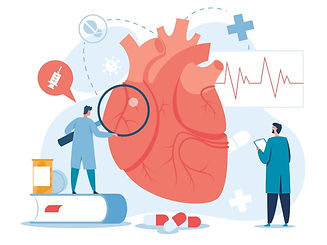
Relationship between Diabetes and Cardiovascular Disease
Statistics
Types of Cardiovascular Disease


Coronary Artery Disease (CAD)
occurs when the major blood vessels supplying the heart, coronary arteries, become narrowed or blocked due to the buildup of plaque. CAD is the leading cause for mortality worldwide
Heart Failure
occurs when the heart is unable to pump blood efficiently to meet the body's demands which results from various conditions like CAD, hypertension, heart muscle damage, or heart valve problems.
Stroke
occurs when the blood supply to a part of the brain is interrupted due to a blood clot or the rupture of a blood vessel which can lead to permanent brain damage or death. In 2019, a stroke was the third leading cause for mortality worldwide.
Arrhythmias
are unusual rhythms of the heart that differ from the body’s natural rhythm which can be caused because the heart beats too slow, fast, or irregularly. This can disrupt the normal pumping of the heart leading to symptoms like palpitations, dizziness, and fainting.
Peripheral artery disease (PAD)
occurs when plaque builds up in the arteries supplying blood to the limbs. It can result in reduced blood flow, pain, and complications like non-healing wounds or limb amputation.
These are just a few of the many Cardiovascular Diseases that threaten the lives of many people. While there is a plethora of cardiovascular diseases, these heart diseases serve to highlight the different conditions, symptoms, and situations of those diseases.
Diabetes and Cardiovascular Disease
The relationship between Diabetes and Cardiovascular DIsease is greater than one deems it to be. According to the CDC, “if you have diabetes, you’re twice as likely to have heart disease or a stroke than someone who doesn’t have diabetes” and “the longer you have diabetes, the more likely you are to have heart disease.” This highlights the severity of not treating and working to treat Diabetes in a person. According to studies published on the NIH, “CVD affects approximately 32.2% of all persons with T2DM” showcasing the risk factor of having Diabetes. Furthermore, “CVD is a major cause of mortality among people with T2DM, accounting for approximately half of all deaths” which accentuates the life threatening concern that Diabetes brings up.
Diabetes plays a significant role in the attainment of Cardiovascular Disease; therefore, it is important to treat Diabetes.